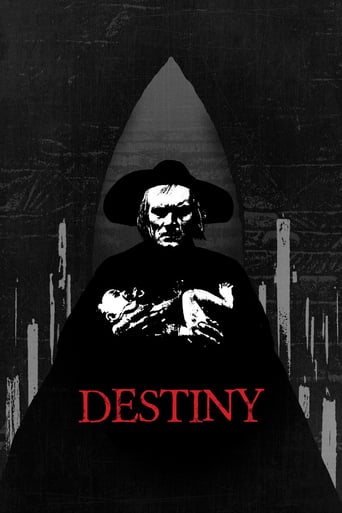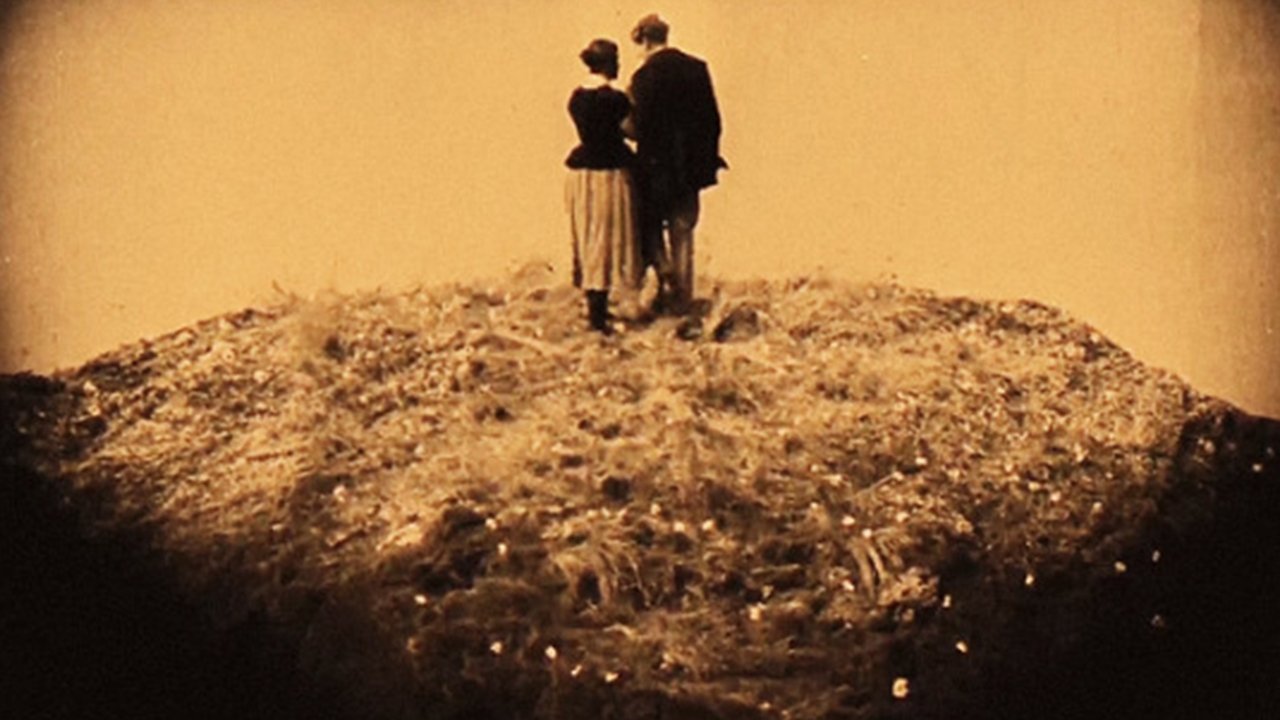pypod
A beautiful parable, pitting the power of love against death. Frits Lang drew tenderness and emotion from actors, scenery, special effects and artful cinematography. The most beautiful, entrancing scenes are those set in a pre-Industial Revolution village in Europe, blending fantasy and atmospheric depth. After pleading with a sad, sympathetic Death, a young woman is given several chances to bring her beloved back to life. Her consciousness travels to destinations around the globe in three stories within the greater story, framed by the primary story set in Europe. Although these wonderful supplemental foreign scenes fall short of the scenes in the primary location, each has marvelous elements of character and magical effects which keep them from dragging the film down. DESTINY a gleaming jewel in Lang's impressive legacy of classic films.
chaos-rampant
Der Mude Tod (the German title is infinitely better than the generic Destiny) consists of three short stories and a bigger overarching one that bookends the film. The first title card reading "Some time at some place" sets the tone somewhere between myth and fantasy and the iconic appearance of a grim, black-clad Death only confirms that. When he claims the life of a young girl's lover, she travels to his lair to plead for him. His lair, a patch of land near a graveyard hidden from a titanic wall, is like a garden of death and when a huge door opens in the previously impenetrable wall the stairs mysteriously lead upwards.Even if Fritz Lang places his Hades up, the concept of a lover pleading to Death for the life of her beloved one is Orphic through and through. Death challenges the girl, each challenge being one of the three stories. All of them are tragic tales of unrequisite love and succeed even as they retread (by now) familiar ground. The second story's ironic finale is a treat even if the logic behind it is a bit shoddy.What really makes Der Mude Tod such a fascinating piece of silent cinema is the finale. Death gives a final chance for the girl to reclaim her lover - to bring him another soul in exchange before midnight. It is then through the small encounters the desperate girl has with an old pharmacist, a mangy beggar and two nagging old nurses that the movie offers those little pieces of insight into human nature that make every great film worth watching. The moral of the case here is that no matter how old, poor, ill and down-trodden one is, life is too precious to give away. A more melodramatic director would just have someone graciously offer the girl his life. Lang instead offers us the understanding that "life is like this!".Der Mude Tod would have been good enough as it is but it's also a treat to look at. The sets and costumes are all quality work, expressionistic enough to be felt but not exaggerated to the point of distracting from the story. Suffice to say this is really a must-see for fans of silent cinema.
MartinHafer
This was an early film of Fritz Lang--before he made his incredibly famous silent METROPOLIS. However, despite being a younger and less experienced director, this film shows a real deftness and I enjoyed it quite a bit.This viewing experience was helped quite a bit by a nice musical score--something that not all silents come with on DVD. As musical scores were almost never written specifically for films, many DVDs have scores that often don't match up well with the films--this is certainly NOT the case with this lovely film.The story is an allegory about death and it reminded me, in part, of Bergman's films "The Seventh Seal", as both films concerned a person trying to make a bargain with the Angel of Death--to somehow get a second chance. "Der Müde Tod" is a bit different because this time it is not the fated to die who tries to make the bargain but his new wife--who can't stand the idea of losing him right after the wedding.Unfortunately, the middle portion of the film is a bit of a drag. While all three segments were well made, they weren't at all necessary to the plot. All three stories were apparently told by Death to illustrate that ones fate cannot be overcome--even by love. All this tended to do, though, was slow down the film. The first and last portions (which dealt with the Angel and the new bride) were exceptional--and just didn't need the three stories. In many ways, this style of filming was a copy of D. W. Griffith's "Intolerance"--as the three stories are meant to illustrate the premise.Fortunately, when these three irrelevant stories are complete, the film jumps back into gear. The Angel tells the lady he is willing to return her husband IF she is able to find someone to take his place in the afterlife. She asks around and naturally no one wants to die. Later, when she comes upon the child in the fire, this leads to a terrific ending--one that really helps the movie to end on an excellent note.Exceptionally beautiful throughout and compelling, this is a silent film worth seeing.
Claudio Carvalho
In a small village somewhere in time, a stranger lease for ninety-nine years a field annex to the cemetery and surround it with a very high wall without gate. When a young couple of travelers stop in a local tavern for resting, the fiancé vanishes and her fiancée seeks him and meets his spirit entering through the wall. She finds an entrance and finds that the stranger is actually Death, who is tired of bringing suffering to the world. She begs for the life of her beloved fiancé, and Death proposes her to save one of three lives that are in the end. If she succeeds, Death will bring her lover back to live. The lady becomes a woman in Persia, in Venice and in China, and in all situations she fails to save her respective lover. Death gives her one last chance, if she manages to find within one hour a person in the village that could give up living. When the local hospital is burning in fire, the young woman realizes the only way to stay with her lover."Der Müde Tod" is another magnificent fantasy of the genius Fritz Lang. Ingmar Berman was certainly influenced and inspired by this stunning film with his masterpiece "Det Sjunde Inseglet" (a.k.a. "The Seventh Seal"). It is amazing how Fritz Lang was able to generate shadows and special effects with the primitive apparatuses in the incipient cinema. Further, the originality of his screenplays is absolutely impressive. "Der Müde Tod" shows wonderful fantasy about the duel between love and death, with a beautiful message in the end, proving that love is stronger than death. My admiration for this master increases after watching each of his movies. My vote is nine.Title (Brazil): "A Morte Cansada" ("The Tired Death")



 AD
AD





